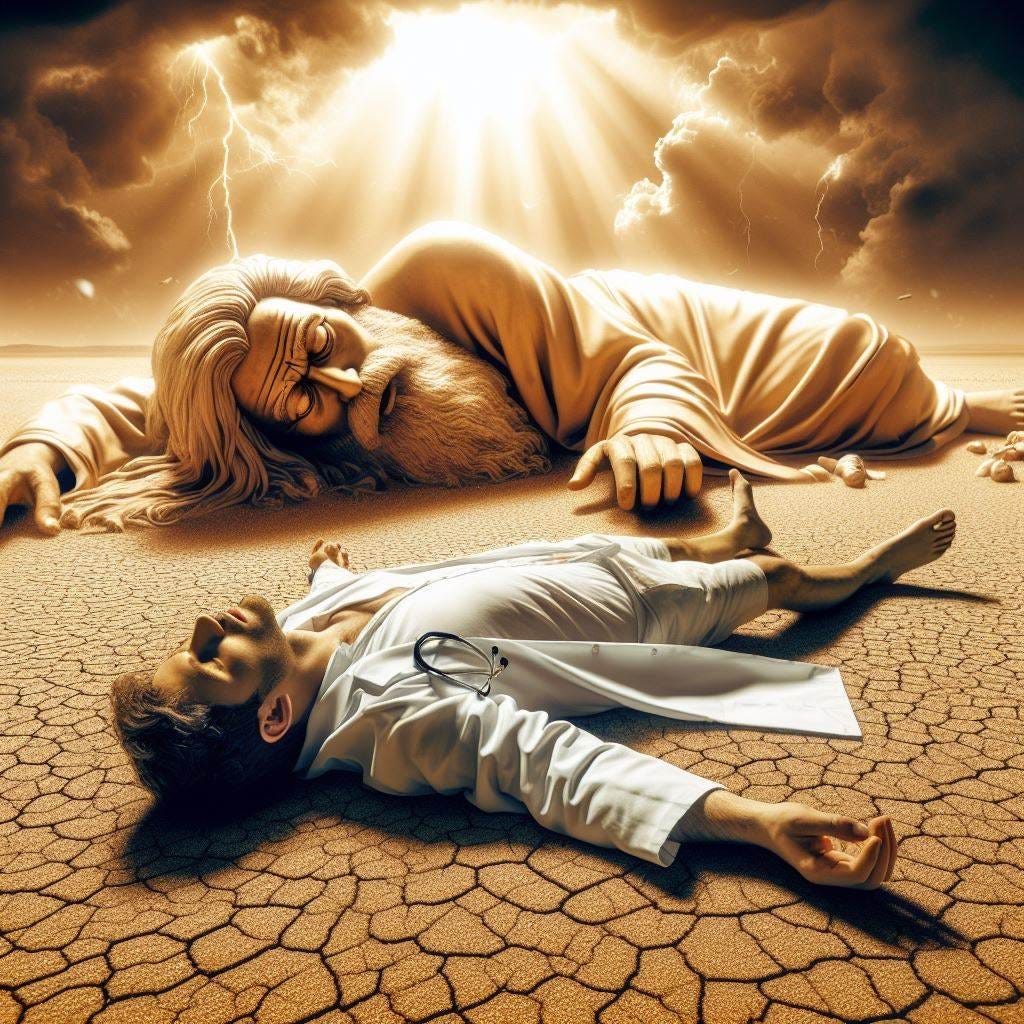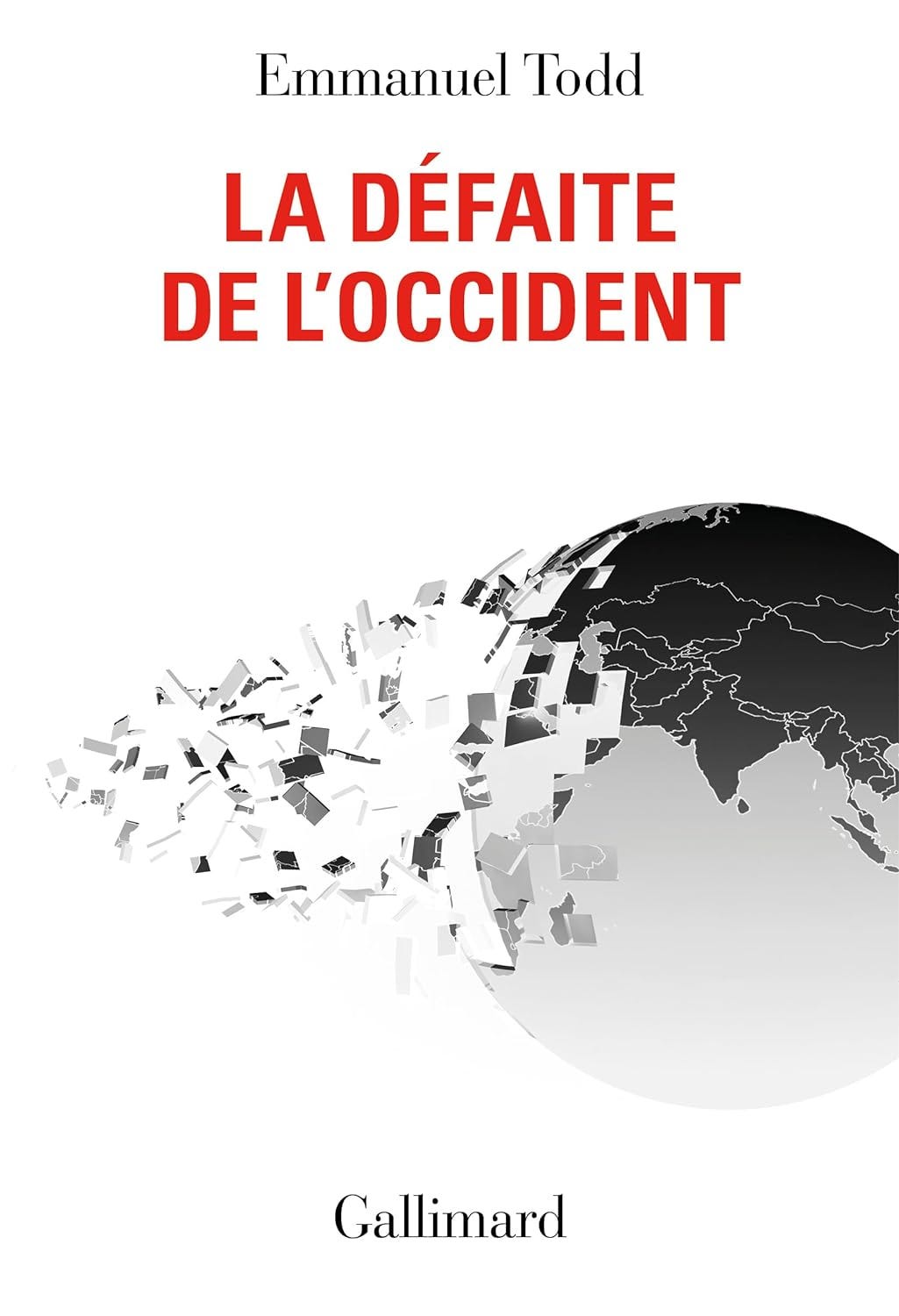The Collapse of Religion -- The Collapse of Science
What happened to these two pillars of society?
Both religion and science lie lifeless on the ground of the Western Memesphere. What happened that destroyed these two entities that, up until not long ago, we saw as pillars of society?
Emmanuel Todd's recent book, “The Defeat of the West,” is rich in ideas and provides an in-depth examination of the current madness enveloping the world and the West in particular.
One especially interesting point in the book is the importance that Todd gives to the decline of religion, Protestantism in particular. Before reading Todd's book, I already noted the decline of beliefs in God in the US, calling it a "Seneca Collapse" of religion. Todd provides a similar interpretation: religion is declining or collapsing everywhere. The past few decades have seen an acceleration of the collapse that led Western society to its current state, which Todd defines as “Nihilism.”
In this stage, the West has lost all its reference points and moves now completely at random—not even like a zombie, which, at least, has an objective in human brains. Instead, says Todd:
The step-by-step implosion of WASP culture - white, Anglo-Saxon and Protestant - since the 1960s has created an empire devoid of center and project, an essentially military organization led by a group without culture (in the anthropological sense) whose fundamental values are power and violence. This group is generally referred to as "neocons".
America no longer has a national ruling class in the classical sense; it no longer even has a well-defined central culture, but it does have a gigantic state and military mechanism, other outcomes are conceivable than the simple retreat of a nation-state.
... Protestantism was indeed the matrix of the West's take-off, but its death today is the cause of its disintegration, and more prosaically, its defeat.
In his book, Todd doesn’t seem overly worried about explaining the deep reasons for religion's collapse. It is just something that happens and that can be used to explain the demographic collapse of the West and its evident disorientation, defeats, and madness.
At the same time, Todd doesn’t explore the trajectory of the “other religion” of the West, the one called Science. Nor does he explore the deep break in Western society created by the COVID-19 pandemic that damaged, perhaps beyond repair, the very fabric of science.
I think we have to go more in-depth into this story. In my previous post, I cited Balaji Srinivasan as stating that “it is not just God that is dead. It is the State that is dying. Because here in the early innings of the 21st century, faith in the State is plummeting.” And let me add that we saw during the Pandemic how deeply the modern state bases itself on Science. The faith in the State is plummeting in parallel with that in Science.
So, why is this happening? I think we need a general definition of the things we are discussing: science, religion, the law system of a state, and some other elements of society we normally take for granted. They are all communication tools. You could define them as “languages.”
A spoken language is not sufficient for significant communication. You may understand what someone is telling you but refuse to act accordingly, say, worshiping Baphomet or shooting unarmed prisoners. Instead, Religion communicates in terms of shared beliefs, even without words. If you see someone making the sign of the cross, you immediately know something about her basic beliefs and view of the world. It is the same for science. Some of its emanations, such as wearing a face mask, are understandable by common people as flags of certain beliefs. More in general, society is a network, and languages are the tool that allows the nodes (people) to communicate with each other. It is communication that keeps the network together. No communication, no network.
So, why did we lose the tool that makes possible the network we call society, its communication system? Whether we think of religion or of science, we see them both lying lifeless on the ground — cadavers from a world that doesn’t exist any longer. To use Tolstoy’s words about Napoleon’s army invading Russia, “what caused this extraordinary occurrence”?
Balaji proposes that Artificial Intelligence has made both the state (including its science) and religion useless. He may be right, although I think he is going too fast. The decline of science and religion began long before AI appeared on the scene. I think there is a more basic explanation that has to do with resources.
Typically, historians and economists seem to think that resources are created by society as needed. In Todd’s vision, Protestantism created an industrial society that then went on to exploit coal and other fossil fuels. Yet, there exists an idea that we call “biophysical economics” that sees things differently: society is created by resources. In other words, Protestantism was created by fossil fuels as a communication tool that allowed us to manage society in such a way as to exploit fossil energy. Without the energy generated by fossil fuels, this society would disappear. And Protestantism, too. This is what’s happening with the demise of fossil fuels. It is caused by the gradual disappearance of those resources that were cheap enough to create the society we know today.
It explains the breakdown of the West and its ongoing defeat. It explains what Todd calls the Washington “blob,” defined as “a group of leaders with no intellectual or ideological ties outside the blob itself.” Communication implies sharing and mutual benefit, but that’s possible only when the available resources are relatively abundant. When they cease to be so, as it is happening now, some sectors of society hoard what’s left for themselves. At this point, the elites have nothing to the rest of society, except in terms of brute force, physical or intellectual. The latter takes the form of the monstrous propaganda machine that the West has created, one would say, with the specific purpose of destroying itself. (Todd often remarks that the West is committing suicide.)
Paraphrasing Martin Luther, “We are here because we can’t avoid being here.” But we are not standing still; we are going somewhere, even though we can’t understand where. A society whose members cannot communicate with each other cannot exist for long. Something new will emerge with a new communication system. Could it be Artificial Intelligence, as Balaji suggests? It may well be, at least if we manage to maintain the huge machine called the Internet. If not, we’ll have to invent something else. A new religion? Or a resurrection of an old one? Or maybe Science could return in a gentler and less hateful way as an entity whose purpose is to help people? The future knows where it is going perfectly well, and we can only follow.
h/t Sys ATI for having pointed to me Todd’s book in a comment and Attila Altan (maybe the same person?) for having provided a copy of the book.







My grandgrandgrandfather took part in the revolutionary movement which 1795 also took place in Switzerland. Then, mankind thought to take its fate in its own hands. Napoleon for a short time was seen as the new Prometheus, freeing humankind from the domination of kings and popes. In this Promethean hope my grandfather entered science becoming a chemist after the model of Pasteur. the aim being to understand and improve life by science. My father entered science becoming a physicist, imagining that by reading the laws of nature he was reading the thoughts of God and at the same time opening ways for improving our existence. I entered science as a physician with the fantasy of improving the life of individuals and even of society (by public health). The overarching idea was a naive belief in "progress" which in my case lasted from adolescence until about 1986.
This belief was fundamentally questioned in 1972 be the report of the Club of Rome. While the Club of Rome still showed paths how to get out of the calamity, these were roads never taken. Now all developments CO2, methane, temperature, water scarcity, species extinction point to a rapidly accelerating march to the abyss which can mean the end of civilisation within decades or even years and which will take place regardless of the possibilities or dangers of artificial intelligence.
The old idea of "progress" has vanished during my lifetime and there is no rational hope that science will get us out of this. On the contrary there is an awareness that we are heading towards a struggle of all versus all, where any means will be justified and utilised. Trump is the man of the hour.
As to religion, I think that some people will turn inwards and find consolation in ideas of philosophy, stoicism, spirituality and indeed sorts of religion. Anyway, that's what happens to me.
Interesting subject indeed.
Despite their obvious and radical differences of method, religion and science fulfil pretty much the same role in a society.
They both are supposed to explain to common people how the world and the universe work in a comprehensive manner so everyday life appears a bit less chaotic and a bit more predictable.
Lightings might occurs because Thor, Zeus or God Almighty is angry. Or because electric charges are building up in the clouds. It doesn't really matter as long as there is an explaination and a way for people to protect themself, either by adding a lightning rod on their roof or making the proper offerings to appease the gods' wrath.
But when a religion is perceived as a tool used by the elite to support and justify the actual social order much more than explaining the way the world works, lay men just stop believing in it. And soon start looking elsewhere for a better explanations for whatever they actually live through.
This is what happened when more and more people turned away from the roman gods and embraced Christianity as the roman religion proved less and less able to maintain the empire integrity and instead was more and more used by the members of the roman elite to justify their wealth (until, btw, they ended up switching to Christianity).
Then, after more and more people in the West embraced the religion of progress (whose science is the backbone) and enjoyed some obvious benefit during 2 or 3 centuries, it is now hitting its hard limits and slowly but surely wearing off. With, I'm afraid so, no religion or spirituality that can properly address the challenges of our time.
Todd's book is definitely worth reading by the way.
Even if I was more interested by the first chapters regarding the Russia/Ukraine situation (and more specifically the demographic dynamic at work over there) than the next ones regarding the situation in other western hemisphere countries.